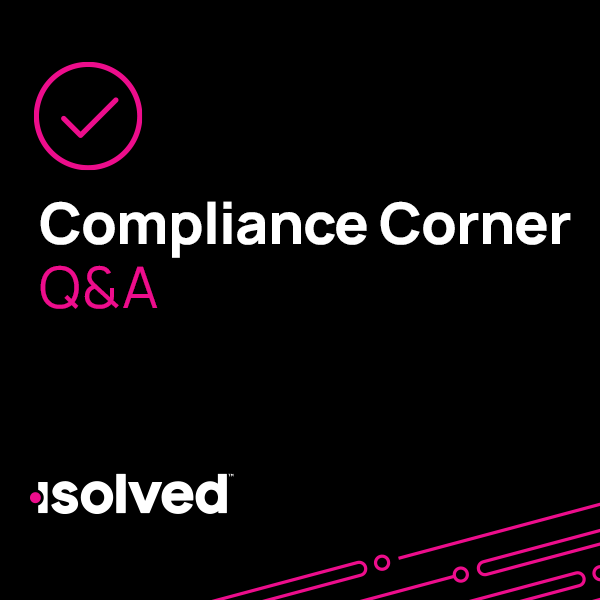Compliance Corner: Q&A on COVID-19 Vaccination Incentives
Thursday September 30th, 2021
Estimated time to read: 4 minutes, 15 seconds

Many businesses have been welcoming employees back to the office in either a hybrid or full-time capacity since the rollout of vaccines in Spring 2021, but doing so comes with its fair share of challenges – especially when states and cities experience a rise in COVID-19 cases.
Recently, President Biden announced an action plan for the pandemic that includes proposals for vaccine mandates and COVID-19 testing. While the details of these proposals are still being sorted out, some employers are searching for ways to encourage employees to get vaccinated – but what are their options?
In this month’s Compliance Corner, isolved Manager of People Services Kevin Peternel is highlighting what employers need to know about incentivizing vaccinations.*
Question: We are considering a bonus payment for vaccinations. What are our options in encouraging employees to get vaccinated?
Answer: In May, the Equal Employment Opportunity Commission (EEOC) confirmed that employers may provide financial incentives to individuals who are vaccinated. The best practice would be to have employees voluntarily provide the employer with documentation or other confirmation that the COVID-19 vaccine was received AND the vaccination was received on their own from a third-party provider that is not an “agent” of the employer.
That being said, there are some issues related to vaccination incentives that employers should be aware of, including:
- Mandatory Vaccination Consideration. Providing incentives does not affect an employers’ ability to require vaccination for employees who physically enter the workplace, however it is important to keep in mind that there are limitations for mandating vaccines under the Americans with Disabilities Act (ADA) and Title VII (reasonable accommodations must be considered), as well as state or local prohibitions (if applicable).
- Third Party Vaccinations. As addressed above, if providing incentives, employers should not administer the vaccinations or sponsor vaccinations at their sites. Organizations may provide unlimited incentives by avoiding the appearance of administering “medical” examinations.
- State-Specific Prohibitions. From a federal standpoint, vaccination mandates and incentives have the green light. This is an evolving issue in some states. Although presently there is very little that appears to restrict vaccine incentives, some states have been addressing vaccine passports and vaccine status documentation for government, private employers and customers. Montana, for example, prohibits discrimination against a person in compensation or in a term, condition or privilege of employment based on the person’s vaccination status. It seems that incentives may be affected by this prohibition. Employers need to be aware if a prohibition does evolve in the state(s) in which they do business. In Wisconsin, there is nothing prohibiting incentives at this time.
- Wage and hour law. The EEOC confirmed that incentive payments are not considered pay for work under the Fair Standards Labor Act and therefore do not need to be further applied in calculating overtime earned for non-exempt employees. State law should be reviewed as well. Generally, incentive payments such as these are considered discretionary– not being tied in any way to quantity or quality of work.
- Accommodations. If individuals have a legally protected reason they cannot get a vaccination, employers must consider reasonable accommodations. Applicable examples might include individuals who cannot physically get a vaccination (ADA issue) or with sincerely held religious beliefs (Title VII Religious discrimination issue). Each case should be reviewed individually. Accommodations might include paying such individuals the incentive payment for activities related to COVID-19 other than actual vaccination, changing work hours, offering remote work, etc. Confidentiality should be maintained.
- Confidentiality. The EEOC confirmed that asking for documentation is not a disability-related inquiry under the ADA. However, information provided should be kept confidential pursuant to the ADA. Also, payments should be kept confidential to only those with a need to know.
- Family members. Employers should focus on employee vaccinations, steering clear of extending conditions to family members (Genetic Information Nondiscrimination Act considerations).
- Consistency. Employers should make sure the policy is applied in a way that does not lead to inadvertent discrimination. Paying all vaccinated employees would not be an issue. Selecting a group of employees for payment may cause a problem. Some individuals and demographic groups may face barriers to receiving a COVID-19 vaccination, which may lead to a disparate impact claim. With the prevalence of COVID-19 vaccination options, we believe the disparate impact issue is a minor consideration.
- Alternatives. Incentives do not need to be a cash payment. Companies are providing vacation time, company-branded merchandise, gift cards or drawings for cash and other items versus a one-to-one payment.
- Policy Considerations. Carefully think through the rules/restrictions regarding the incentive payment.
- Who will be delegated to confirm vaccination status of employees? Will records be kept? If so, where?
- What documentation besides the COVID-19 Vaccination Record Card will be accepted? Will only hard copy documentation be accepted or will viewing information on cell phones be permitted? It is not advisable to review explanation of benefit statements or other such information.
- Is timing of vaccination language going to be incorporated to get people to make it a priority sooner versus later?
- Will incentives be a one-time payment or paid over a series of checks?
- Will payments be processed on payroll?
- Will payments occur as submitted (on the next payroll) or will they all occur on a set date?
- Will language include “must be on the payroll at time of payment?”
- Will payments only occur after “complete” vaccination regiment is achieved (one dose for Johnson & Johnson and two doses for Pfizer and Moderna)?
- Will the policy include any type of requirement or additional incentive for booster shot(s) when available?
- Is there a sunset to the payment policy to perhaps avoid confusion on additional vaccination requirements in the future?
- Payments will be considered taxable earnings. Organizations wishing to provide a specified net amount will need to gross up the payments.
- Will payment be provided to all employees regardless of number of hours regularly worked or prorated for part time?
- Presumably, employees already vaccinated will receive an incentive payment (effective date is retroactive to date vaccines were first available).
- Will eligibility for payment be conditioned on hire date (e.g., someone hired after being vaccinated would be ineligible for an incentive)?
When it comes to returning to the office and whether or not to mandate or incentivize COVID-19 vaccines, there is a lot that employers need to take into consideration. This information, however, should provide a good starting point for HR teams developing policies for their organizations.

About Kevin:
Kevin Peternel is an isolved People Services Manager with over 35 years of generalist human resources, business management and ownership experience. He has spent the last ~20 years providing HR and business consulting services to organizations of all sizes and in a wide variety of industries. He holds a master’s degree and two senior level HR certifications. Kevin currently manages a team of people providing support to isolved’s custom outsourced people services clients.
* This blog is not legal advice. Please seek proper legal advice.
Need assistance completing your critical HR tasks? Discover how isolved People Services can help.
